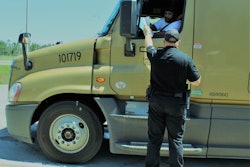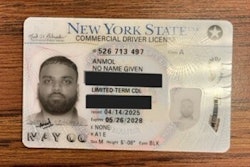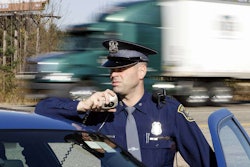The DOT’s sweeping new rule seeking to purge nearly 200,000 non-domiciled CDL holders from truck driving has come under fire as a possible violation of civil rights in comments filed to the Federal Register.
DOT in September made the unprecedented move of putting out an Interim Final Rule (IFR) that outright seeks to boot 194,000 non-citizen CDL holders from the trucking industry, citing widespread problems with CDL issuance and five deadly crashes this year involving non-domiciled drivers.
That's 194,000 drivers who presumably hold a job and paid good money for a CDL that the government now plans to strip from them in part in the name of safety. Yet the Federal Motor Carrier Safety Administration itself said there's no rock-solid evidence that these drivers are generally less safe than others.
"There is not sufficient evidence, derived from well-designed, rigorous, quantitative analyses, to reliably demonstrate a measurable empirical relationship between the nation of domicile for a CDL driver and safety outcomes in the United States such as changes in frequency and/or severity of crashes or changes in frequency of violations," FMCSA's IFR states.
Rather than cite such a big study, FMCSA outlines five recent, horrific crashes involving non-domiciled drivers. The National Highway Traffic Safety Administration and FMCSA itself consistently catalog about 5,000 fatal truck-involved crashes annually.

Overdrive readers tend to agree with FMCSA on the safety front, with 64% of readers earlier this year noting opposition to non-domiciled CDLs issued to non-citizens on safety and economic fairness grounds.
"If a government agency enacts a rule that explicitly discriminates based on immigration status, we would like them to show evidence that they expect there to be some kind of safety benefit," said Mannirmal Kaur, senior federal policy manager at the Sikh Coalition, an organization that advocates for the rights of immigrants.
Kaur said the coalition plans to comment on FMCSA's IFR directly, and that the hundreds of comments from people saying the rule negatively impacts them could spark legal action against it.
Other commenters who've already weighed in on the IFR publicly, many who appear to be non-domiciled CDL holders themselves, raise legal challenges to DOT's non-domiciled CDL rule changes.
One anonymously-submitted comment cites a boatload of legal precedent. Asylum seekers, a group of immigrants that typically don't hold visas and comprised a large share of the immigrants who entered the country during the Biden administration, do have the right to work in the United States, that comment notes, citing 8 U.S. Code. § 1158(c)(1)(B).
Asylee status "shall authorize the alien to engage in employment in the United States and provide the alien with appropriate endorsement of that authorization," according to law cited.
"FMCSA justifies its rule on the grounds of 'road safety.' However, immigration status has no correlation with driving skills," the commenter said. "The law already contains strict safety and qualification criteria -- medical exams, testing, and licensing standards." The commenter cited 49 USC Chapter 313; 49 Code of Federal Regulations Parts 383–384, pertaining to governing CDL standards.
In other words, if someone can pass the CDL test, what's the problem? Unfortunately, as CDL schools themselves have pointed out, bad schools and testing exist. And certainly, as countless owner-operators have noted, bad drivers are out there.
[Related: CDL schools call out 'threat' of 'unscrupulous training entities']
Yet the commenter writes that "by excluding refugees, asylees, and [Employee Authorization Document] holders from CDL eligibility, FMCSA unlawfully deprives them of employment rights explicitly guaranteed by Congress."
The comment cites about a dozen settled cases and federal laws, but FMCSA's new rule does not bar any would-be immigrant to the U.S. from working, it merely bars them from holding a CDL.
Another commenter, this one a self-professed non-domiciled CDL holder from Russia, begins his comment this way: "With deep respect and gratitude to the United States of America -- a nation that has given my family and me safety, dignity, and a new beginning when our home countries fell into war."
From the comment:
I am a professional truck driver. I take pride in my work. I have a clean driving record and was recognized as the #1 safest driver in my company based on safety score. Trucking is not just a job -- it’s how I provide for my family, how I contribute to the American economy, and how I feel part of this great nation. My wife stays home to raise our baby, and I work long hours to make sure they have everything they need.
I hold a valid Employment Authorization Document (EAD) until 2028. However, under the proposed rule FMCSA-2025-0622, people like me -- asylum applicants with EAD -- may lose the ability to renew or maintain a CDL simply because we do not yet have a Green Card or citizenship. I respectfully ask you to reconsider this restriction.
This comment also cites the Immigration and Nationality Act and concludes that DOT's new rule "may unintentionally punish thousands of honest, hard-working immigrants who are legally authorized to work and who contribute daily to America’s economy."
Another commenter put things more simply: "This law deprives me of the opportunity to earn money and pay off the loan for the truck and trailer. For the last three years, all my inspections have been clean. I am a professional in my field. This law violates my rights."
These are just three of nearly 3,000 comments on the rule so far. Hundreds speak in full-bodied support of the DOT's move, hoping it will restore freight rates and trucking's place as a noble profession in the country.
Overdrive shared some the commentary alleging civil rights violations with a lawyer with transportation experience, and while the lawyer conceded the comments make some good points, they did point to a glaring issue with non-domiciled CDL holders: A lack of scrutiny on driving and criminal history or records for individuals applying for non-domiciled CDLs.
All CDL holders and applicants know that they have to submit years' worth of driving records and get a background check, but nationals from other countries don't go through that step. Similarly, with respect to English language proficiency and roadside inspections, many inspectors have routinely noted they won't get under a truck for a full inspection if the driver doesn't demonstrate good English.
[Related: Did DOT Secretary Duffy just kill trucking's 'driver shortage' narrative once and for all?]
FMCSA doesn't place its entire justification for the IFR on an anecdotal safety argument. It invokes something dozens of Overdrive readers have repeated: This is a national security concern.
"Although FMCSA’s primary focus in this rulemaking is on highway safety, the Agency notes that issuance of CLPs and CDLs to foreign individuals does have national security implications that should not be overlooked," the rulemaking states. "Failure to properly vet such individuals raises the risk that individuals with malicious intent could gain authorized control of CMVs, which can be used to transport hazardous materials and target critical infrastructure or to otherwise carry out a terrorist attack."
FMCSA goes on to cite a 2017 attack from a foreign CDL holder in a medium-duty truck as evidence of the security threat.
In the entire immigration enforcement conversation in trucking, from before and after President Donald Trump's April English language proficiency mandate, the administration has invoked "common sense." It's common sense, surely, that knowing how to communicate with law enforcement and other drivers and read road signs contributes to safety.
Asked directly by Overdrive about the civil rights challenges brought against the new rule, DOT again appealed to common sense.
“The rule on non-domiciled CDLs is about safety and the integrity of the CDL issuing process. It’s really that simple," a DOT spokesperson said. "The rule ensures that anyone operating a commercial motor vehicle is properly identified, vetted, and licensed under U.S. law to protect the safety of everyone traveling on American roads.”
Overdrive asked the commenter from Russia about the "integrity" concerns voiced by DOT, and he responded that if "FMCSA believes that some CDLs were issued improperly by certain schools or DMVs, the fair approach is to review those specific institutions, audit their training and testing standards, and require retraining when necessary."
Individuals can decide for themselves if the rule is that plain or simple, or just makes common sense. A court, however, would have to answer questions of legality and constitutionality, or if the rule violates the civil rights of recent arrivals.
That is, if someone sues. Thus far, even big players that promote the "driver shortage" narrative, or who often bring litigation and get intimately involved with regulatory actions, have only supported DOT's new IFR.
[Related: ICE arrests Anmol 'No Name Given' from 'corrupt' New York: Who is to blame?]










